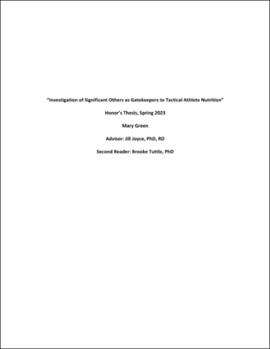| dc.contributor.author | Green, Mary | |
| dc.date.accessioned | 2023-06-01T21:40:16Z | |
| dc.date.available | 2023-06-01T21:40:16Z | |
| dc.date.issued | 4/27/2023 | |
| dc.identifier.uri | https://hdl.handle.net/11244/337756 | |
| dc.description.abstract | Objective: The purpose of this study was to determine how significant others, or spouses, of emergency medical technicians (EMT), firefighters, law enforcement officers (LEO), and military personnel (i.e., tactical athletes, TA) act as gatekeepers of TA nutrition. | |
| dc.description.abstract | Methods: This cross-sectional study employed two online surveys (Qualtrics), one for TAs and one for their spouses. Survey questions included demographics, relationship and family information, type of TA, meal planning/ preparation and eating habits, perceived influence of spouse and coworkers on eating habits, and dietary quality. Statistical analyses included descriptive statistics, t-test, Chi-square, and one-way ANOVA. | |
| dc.description.abstract | Results: Thirty spouses and 26 TAs completed the online surveys. Spouse influence scores on their TA's eating habits on and off shift were 15.3 ± 6.0 and 18.7 ± 5.3 out of 30 (average influence), per spouses and TAs respectively. Tactical athlete influence scores on their own eating habits on and off shift were 14.6 ± 2.4 and 11.4 ± 3.1 out of 20 (average influence), per spouses and TAs respectively. Frequency of meals and snacks consumed at home versus away from home by the TA differed significantly by spouse employment status (p=0.006) and spouse average hours worked (p=0.022). Meals made at home by the spouse or TA for the TA to take to work differed significantly by average hours worked by the spouse (ps<0.05), cost as a barrier score (p=0.006), and spouse age (p<0.001). Dietary quality ratio of the TA differed significantly by spouse hours worked (p=0.044), frequency of eating at home (p=0.003), spouse influence score 2 (p=0.013), and type of TA (p=0.036). | |
| dc.description.abstract | Conclusions: Spouses appear to influence TA eating habits on and off shift, including how they obtain their meals as well as the quality of them. Considering the disproportionately high and ever-increasing prevalence of chronic disease among tactical populations, nutrition and health interventions targeting spouses may be effective in slowing these trends. Ongoing research in our lab includes gathering focus group data to further detail the tactical athlete spouse influence on eating, nutrition, and health and to determine what they want and need in a program tailored to them. | |
| dc.format | application/pdf | |
| dc.language | en_US | |
| dc.rights | Copyright is held by the author who has granted the Oklahoma State University Library the non-exclusive right to share this material in its institutional repository. Contact Digital Library Services at lib-dls@okstate.edu or 405-744-9161 for the permission policy on the use, reproduction or distribution of this material. | |
| dc.title | Investigation of significant others as gatekeepers to tactical athlete nutrition | |
| osu.filename | oksd_green_investigation_of_significant_others_2023.pdf | |
| osu.accesstype | Open Access | |
| dc.type.genre | Honors Thesis | |
| dc.type.material | Text | |
| dc.subject.keywords | tactical athlete | |
| dc.subject.keywords | spouse | |
| dc.subject.keywords | eating habits | |
| dc.contributor.director | Joyce, Jill | |
| dc.contributor.facultyreader | Tuttle, Brooke | |
| thesis.degree.discipline | Nutritional Sciences | |
| thesis.degree.grantor | Oklahoma State University | |
